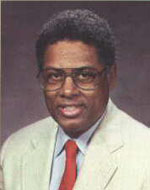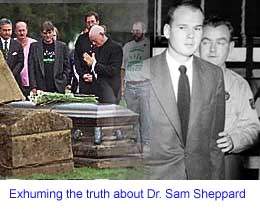|
|
Thomas Sowell
NEW DNA EVIDENCE was brought forth recently by those who argued that Dr. Sam Sheppard was wrongly
convicted of the murder of his wife in a sensational case back in the 1950s. Whether "Dr. Sam" was innocent or
guilty, his case represented both an injustice and an indictment of our legal system -- and one that is very
relevant to the current Monica Lewinsky frenzy in the media.
Sam Sheppard served 12 years in prison and was then released by an appellate court decision that massive
pre-trial publicity had prevented his getting a fair trial. If Sheppard was innocent, then the 12 years unjustly spent
behind bars was an outrage. If he was guilty, then it was an outrage to let a murderer go free because of media
hoopla.
In the current grand jury investigation of President Clinton, all we are getting is media hoopla, because both the
Is the purpose of legal proceedings to get at the truth or to provide media entertainment? The British deal with
the conflict between media circuses and fair trials by restricting out-of-court statements from being published
until after the trial is over.
Had this been done in the case of Dr. Sam Sheppard, the jury could have decided that case solely on the basis
of the evidence presented in court -- the way it is supposed to be done -- unaffected by sensational media
reports.
Today, if we used the British system, we would not be hearing about Monica Lewinsky around the clock, and
would not even know who she was until the grand jury completed its work or until the House of Representatives
received an official report of the investigation.
Whoever is leaking grand jury testimony -- or alleged grand jury testimony -- is obviously doing so because they
expect to do better in the media than they can in a court of law or in an impeachment proceeding in the House
of Representatives. In short, these leaks and lawyers' statements are designed to prevent the legal issues from
being decided on their legal merits.
Media defenders are quick to cry out about "the public's right to know," when in fact they are talking about the
media's ability to boost ratings and spread confusion with unsubstantiated statements by those with an axe to
grind. The public has a right to know the facts, but they can only know what the facts really are after the
investigation is over and the issues have been tried.
In the meantime, the very purpose of the investigation is being misconstrued by those under investigation, as
well as by their lawyers, witnesses and talk-show hosts.
Contrary to the spin-masters, Kenneth Starr is not going to indict Bill Clinton for sexual misconduct. The special
prosecutor is investigating whether the president is subverting the whole system of laws that he is sworn to
uphold by committing perjury, trying to get others to commit perjury and paying them off for their silence or their
lies. That is serious stuff and it ought to be treated as serious, even if that means holding off the media hounds
until the facts are all in.
The British have squarely faced the fact that there is an irreconcilable conflict between sensationalism and
justice -- and they have chosen justice, even if that cramps the style of the media.
Over here, mindless repetition of the phrase "free speech" is used to escape the responsibility that goes with
that right. The British also have free speech. In fact, that is where the American conception of free speech
originated.
But free speech has never been a blank check. You can be prosecuted for threats, for fraudulent
misrepresentations, for inciting to riot or for blaring your sound truck in a residential neighborhood at 2 AM. It is
hogwash that any limitation on what the media can say is a violation of the First Amendment.
Yet media journalists have a vested interest in promoting this hogwash, as they promote many other
misconceptions. Just as the Sam Sheppard case represented an injustice brought on by the media, whether he
was innocent or guilty, so there will be a national injustice if the investigation of the president cannot be decided
on its merits by the legal system because of media
 Media Circus versus Justice
Media Circus versus Justice
 special prosecutor and members of the grand jury are forbidden to reveal what goes on behind closed doors.
That leaves the field wide open for those who are being investigated to say anything they please on television,
including telling any lie about the special prosecutor, who is forbidden even to correct what they say with the
truth.
special prosecutor and members of the grand jury are forbidden to reveal what goes on behind closed doors.
That leaves the field wide open for those who are being investigated to say anything they please on television,
including telling any lie about the special prosecutor, who is forbidden even to correct what they say with the
truth.
3/6/98: Vindication
3/3/98: Cheap Shot Time
2/26/98: The Wrong Filter
2/24/98: Trial by Media
2/20/98: Dancing Around the Realities
2/19/98: A "Do Something" War?
2/12/98: Julian Simon, combatant in a 200-year war
2/6/98: A rush to rhetoric